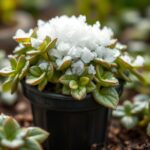Discover Which Plants Like Eggshells? Benefits and Best Options for Your Garden

Eggshells are often overlooked as a valuable resource in gardening, yet they offer numerous benefits for various plants. Packed with calcium and other essential nutrients, crushed eggshells can enhance soil quality, promote healthy growth, and deter pests. In this article, we will explore which plants thrive with the addition of eggshells, examining their unique needs and how this natural amendment can support their development. Whether you’re a seasoned gardener or a novice, understanding the best options for integrating eggshells into your gardening routine can lead to a flourishing and vibrant garden. Discover the potential of eggshells for your green thumb!
Which Plants Benefit from Eggshells?
Many plants thrive when supplemented with eggshells due to the high levels of calcium they provide. This natural amendment can help to prevent blossom end rot in fruits like tomatoes and zucchini, as well as boosting overall plant health. When eggshells decompose, they break down into calcium carbonate, which enriches the soil and promotes better root development. Additionally, the gradual release of nutrients from the eggshells can lead to improved growth in plants that are particularly sensitive to calcium deficiencies.
Tomatoes
Tomatoes are highly sensitive to calcium levels, and using eggshells in the soil can help prevent blossom end rot, a common issue where the blossom end of the fruit darkens and rots. By adding crushed eggshells to the soil, gardeners can ensure a steady supply of calcium, promoting stronger cell walls and better overall fruit quality.
Peppers
Like tomatoes, peppers also benefit greatly from the calcium that eggshells provide. The use of eggshells can enhance the overall nutrient profile of the soil, helping to produce healthier and more vibrant plants. This additional calcium aids in the development of strong tissues, leading to a more robust harvest.
Eggplants
Eggplants are another plant that appreciates the addition of eggshells to their growing medium. The calcium from the eggshells not only helps to mitigate the risk of blossom end rot but also supports the development of lush foliage. By incorporating crushed eggshells into the soil, gardeners can enhance the growth and vitality of eggplants.
See also:
Roses
Roses can also benefit from the calcium-rich content of eggshells. The inclusion of this natural amendment can help to improve soil structure and nutrient availability, resulting in healthier plants with enhanced flowering. The added calcium contributes to stronger stems and a more vibrant display of blooms in these delightful garden favorites.
Houseplants
Many houseplants will thrive with the addition of crushed eggshells mixed into their potting soil. The slow release of calcium not only promotes root growth, but it also helps maintain the overall health of the plant by preventing nutrient deficiencies. Additionally, the organic nature of these materials makes them suitable for a variety of plants, enhancing their growth potential without the risk of chemical buildup.
| Plant | Benefit |
|---|---|
| Tomatoes | Prevent blossom end rot |
| Peppers | Enhance nutrient profile |
| Eggplants | Support lush foliage |
| Roses | Improve soil structure |
| Houseplants | Promote root growth |
Why Eggshells Are a Great Addition to Your Garden Soil
Eggshells are a rich source of calcium carbonate, which plays a vital role in promoting healthy plant growth. When added to the soil, they gradually decompose, releasing essential nutrients that help in strengthening plant cell walls and improving root development. This natural amendment can significantly benefit acid-loving plants and enhance the overall health of your garden by improving soil structure and drainage. Furthermore, eggshells can help to deter common garden pests like snails and slugs, making them a versatile and valuable addition to your gardening practices.
Which Plant Species Benefit Most from Eggshells?
Certain plant species, including tomatoes, peppers, and eggplants, thrive when given the added calcium from eggshells. These plants often suffer from blossom end rot, a common issue linked to calcium deficiency. By incorporating crushed eggshells into the base of these plants, you can effectively prevent this problem while promoting healthier fruit production. Other vegetables like cabbage and lettuce also appreciate the calcium boost, ensuring that they grow vigorously and remain disease-resistant.
How to Prepare Eggshells for Garden Use
To maximize their benefits, it is crucial to properly prepare eggshells before introducing them into your garden. Start by rinsing the eggshells to remove any residual egg white or yolk, which can attract pests. Once clean, let them dry completely, and then crush them into small pieces or grind them into a fine powder for easier incorporation into the soil. This preparation increases the surface area and makes the calcium more readily available for your plants, enhancing their overall accessibility to the nutrients.
See also:
The Environmental Benefits of Using Eggshells in Your Garden
Utilizing eggshells in your garden is a fantastic way to promote sustainability and reduce waste. By repurposing what would otherwise be a kitchen waste product, you contribute to a circular economy within your gardening practices. The addition of eggshells not only enriches the soil but also lessens the need for chemical fertilizers, thereby protecting the ecosystem and promoting healthier soil microbiomes. By choosing natural amendments like eggshells, you embark on a more ecologically responsible gardening journey.
Usage Tips for Maximum Effectiveness
To maximize the effectiveness of eggshells, consider mixing them with other organic materials such as compost or soil amendments. This combination enhances nutrient availability and soil structure, promoting better plant health. Applying crushed eggshells directly around the base of plants can also create a barrier against pests while providing a slow-release source of calcium. Regularly monitor your soil’s pH and nutrient levels to determine the optimal amount of eggshells to use for your specific garden needs.
Homemade Fertilizer Solutions with Eggshells
Eggshells can be incorporated into homemade fertilizer solutions to provide a nutrient-rich option for your plants. Combine crushed eggshells with ingredients like coffee grounds, which add nitrogen, or banana peels, which offer potassium. This combination creates a well-rounded fertilizer that promotes soil health and encourages strong plant growth. By using eggshells in this way, you can produce an effective organic fertilizer that enhances biodiversity in your garden and reduces the reliance on synthetic fertilizers.
Questions from Our Readers
Which plants benefit from crushed eggshells?
Crushed eggshells are particularly beneficial for tomatoes, peppers, and squash as they provide a slow-releasing source of calcium, which helps prevent blossom end rot and promotes overall plant health.
How should I prepare eggshells for my plants?
To prepare eggshells for your plants, first clean them thoroughly to remove any egg residue, then allow them to dry completely. After drying, you can crush them into small pieces or grind them into a fine powder to make it easier for your plants to absorb the nutrients.
See also:
Can all plants take advantage of eggshells?
Not all plants require eggshells; however, most fruiting plants and vegetables benefit from the additional calcium. Conversely, acid-loving plants like blueberries or azaleas might not appreciate the alkaline nature of eggshells.
How often should I apply eggshells to my plants?
You can apply crushed eggshells to your plants once every few months, depending on the plant's nutrient needs. It's recommended to mix the eggshells into the soil or sprinkle them around the base of the plants for the best absorption of nutrients.

If you want to read more articles like Discover Which Plants Like Eggshells? Benefits and Best Options for Your Garden, we recommend you check out our Plants category.
Leave a Reply
Related Articles